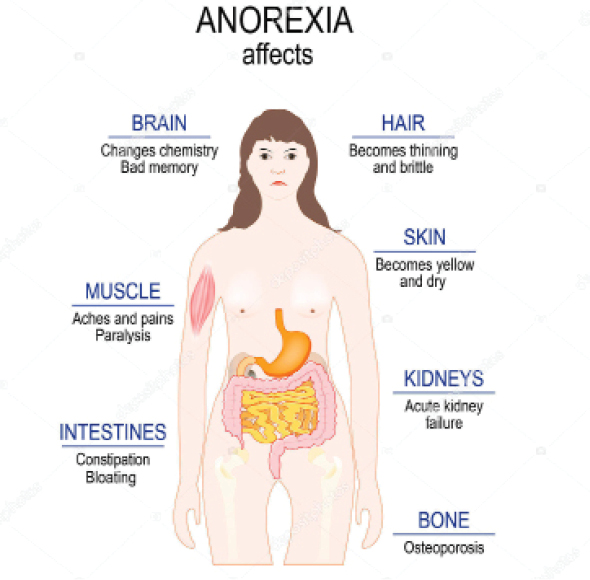Anorexia Nervosa among young ladies
I wish to commend you and Daily Trust for your column last week about ‘Depression among teenagers’. I benefitted a lot from it. I wish to also ask that you talk about eating disorder which is affecting young ladies – ‘Anorexia nervosa’. Wishing you and the newspaper all the best. Gloria V Thanks Gloria […]

Anorexia Nervosa
I wish to commend you and Daily Trust for your column last week about ‘Depression among teenagers’. I benefitted a lot from it. I wish to also ask that you talk about eating disorder which is affecting young ladies – ‘Anorexia nervosa’. Wishing you and the newspaper all the best.
Gloria V
Thanks Gloria for your question and your kind words for our newspaper. Regarding your enquiry, Anorexia nervosa is a type of eating disorder. People who have anorexia have an intense fear of gaining weight. They severely limit the amount of food they eat and can become dangerously thin.
Anorexia affects both the body and the mind. It may start as dieting, but it gets out of control. You think about food, dieting, and weight all the time. You have a distorted body image. Other people say you are too thin, but when you look in the mirror, you see a fat person.
Anorexia usually starts in the teen years. It’s much more common in females than males, as your¬ question also pointed out. Early treatment can be very effective. But if not treated early, anorexia can become a lifelong problem. Untreated anorexia can lead to;
- Starvation
- Serious health problems, such as bone thinning, kidney damage, and heart problems.
Some causes of Anorexia
Eating disorders are complex, and experts don’t really know what causes them. But they may be due to a mix of family history, social factors, and personality traits. You may be more likely to have anorexia if:
- Other people in your family have an eating disorder, such as anorexia.
- You have a job or do a sport that stresses body size, such as ballet, modeling, or gymnastics.
- You are the type of person who tries to be perfect all the time, never feels good enough, or worries a lot.
- You are dealing with stressful life events, such as divorce, moving to a new town or school, or losing a loved one.
What are the symptoms?
- Weigh much less than what is healthy or normal.
- Very afraid of gaining weight.
- Refuse to stay at a normal weight.
- Think they are overweight even when they are very thin.
- Their lives become focused on controlling their weight.
- Obsessed about food, weight, and dieting.
- Strictly limit how much they eat.
- Exercise a lot, even when they are sick.
- Vomit or use laxatives to avoid weight gain.
How to Diagnose
If your doctor suspects that you have anorexia nervosa, he or she will typically do several tests and exams to rule out medical causes for the weight loss, and check for any related complications.
These exams and tests generally include:
- Physical exam. This may include measuring your height and weight; checking your vital signs,
- Lab tests. These may include a complete blood count (CBC) and more-specialized blood tests to check electrolytes and protein as well as functioning of your liver, kidney and thyroid. A urinalysis also may be done.
- Psychological evaluation. A doctor or mental health professional will likely ask about your thoughts, feelings and eating habits. You may also be asked to complete psychological self-assessment questionnaires.
Some Treatment options
Here’s a look at what’s commonly involved in treating people with anorexia.
- Some clinics specialize in treating people with eating disorders. They may offer day programmes or residential programmes rather than full hospitalisation. Specialised eating disorder programmes may offer more-intensive treatment over longer periods of time.
- Because of the host of complications anorexia causes, you may need frequent monitoring of vital signs, hydration level and electrolytes, as well as related physical conditions. Restoring a healthy weight.
- A psychologist or other mental health professional, who can work with you to develop behavioural strategies to help you return to a healthy weight.
- A dietitian, who can offer guidance getting back to regular patterns of eating, including providing specific meal plans and calorie requirements that help you meet your weight goals.
